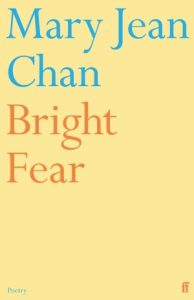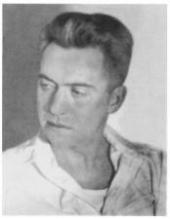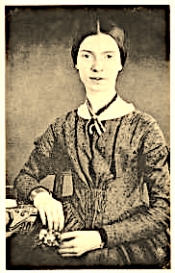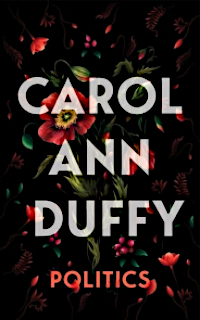Fleurs du Mal Magazine


Or see the index

Gentilesse
The firste stok, fader of gentilesse —
What man that desireth gentil for to be
Must folowe his trace, and alle his wittes dresse
Vertu to love and vyces for to flee.
For unto vertu longeth dignitee
And noght the revers, saufly dar I deme,
Al were he mytre, croune, or diademe.
This firste stok was ful of rightwisnesse,
Trewe of his word, sobre, pitous, and free,
Clene of his gost, and loved besinesse,
Ayeinst the vyce of slouthe, in honestee;
And, but his heir love vertu as dide he,
He is noght gentil, thogh he riche seme,
Al were he mytre, croune, or diademe.
Vyce may wel be heir to old richesse,
But ther may no man, as men may wel see,
Bequethe his heir his vertuous noblesse
(That is appropred unto no degree
But to the firste fader in magestee,
That maketh hem his heyres that him queme),
Geoffrey Chaucer
(1343 – 1400)
Gentilesse
• fleursdumal.nl magazine
More in: # Classic Poetry Archive, Archive C-D, Archive C-D, Geoffrey Chaucer

En la forest de Longue Attente
En la forest de Longue Attente
Entrée suis en une sente
Dont oster je ne puis mon cueur,
Pour quoy je vis en grant langueur,
Par Fortune qui me tourmente.
Souvent Espoir chacun contente,
Excepté moy, povre dolente,
Qui nuit et jour suis en douleur
En la forest de Longue Attente.
Ay je dont tort, se je garmente
Plus que nulle qui soit vivante ?
Par Dieu, nannil, veu mon malheur,
Car ainsi m’aid mon Createur
Qu’il n’est peine que je ne sente
En la forest de Longue Attente.
Marie De CLÈVES
(1426-1487)
En la forest de Longue Attente
• fleursdumal.nl magazine
More in: # Classic Poetry Archive, Archive C-D, Archive C-D
This keenly anticipated new collection from the Costa Poetry Award-winner speaks ‘out of fear and grief into splendour and joy’.
 Following their award-winning debut, Flèche (2019), comes Mary Jean Chan’s gleaming second collection: Bright Fear. Through poems which engage fearlessly with intertwined themes of identity, multilingualism and postcolonial legacy, Chan’s latest work explores a family’s evolving dynamics, as well as microaggressions stemming from queerphobia and anti-Asian racism that accompanied the Covid pandemic.
Following their award-winning debut, Flèche (2019), comes Mary Jean Chan’s gleaming second collection: Bright Fear. Through poems which engage fearlessly with intertwined themes of identity, multilingualism and postcolonial legacy, Chan’s latest work explores a family’s evolving dynamics, as well as microaggressions stemming from queerphobia and anti-Asian racism that accompanied the Covid pandemic.
Yet Bright Fear remains deeply attuned to moments of beauty, tenderness and grace. It asks how we might find a home within our own bodies, in places both distant and near, and in the ‘constructed space’ of the poem. The contemplative central sequence, Ars Poetica, traces the radically healing and transformative role of poetry during the poet’s teenage and adult years, culminating in a polyphonic reconciliation of tongues. Throughout, Chan offers us new and galvanising ways to ‘withstand the quotidian tug- / of-war between terror and love’.
Mary Jean Chan is the author of Flèche (Faber, 2019), which won the Costa Book Award for Poetry and was shortlisted for the International Dylan Thomas Prize, the John Pollard Foundation International Poetry Prize, the Jhalak Prize, the Seamus Heaney Centre First Collection Poetry Prize and a Lambda Literary Award. Chan won the 2018 Geoffrey Dearmer Prize and was shortlisted for the Forward Prize for Best Single Poem in 2017 and 2019, receiving an Eric Gregory Award in 2019. Chan co-edited the anthology 100 Queer Poems (Vintage, 2022) with Andrew McMillan, and is a judge for the 2023 Booker Prize. Born and raised in Hong Kong, Chan serves as Senior Lecturer in Creative Writing (Poetry) at Oxford Brookes University and lives in Oxford.
Most mornings, you see the face
of a boy in the mirror. You
expect to fall in love with him,
someday. Meanwhile, your fingers
brush the wrist of another girl as
you jostle into the assembly hall,
and you understand that sin was
never meant to be easy, only
sweet. What might light up the
pond you sat beside in dreams,
eyeing skin and so much depth it
would be years before you dared?
What curvature of tongue might
you taste, as if another’s breath
were blessing? One night, you find
yourself back there. You dream.
A voice says: Hell is not other
people. You sink, stripped of the
glowing dress you wore for
thousands of days.
(fragment poem)
Bright Fear
by Mary Jean Chan
(Poems)
Publisher: Faber & Faber;
Main edition
3 August 2023
Language: English
ISBN-10: 0571378900
ISBN-13: 978-0571378906
Dimensions: 15.8 x 0.6 x 20.5 cm
Paperback
72 pages
£10.99
• fleursdumal.nl magazine
More in: #Editors Choice Archiv, - Book News, - Bookstores, Archive C-D, Archive C-D, Racism

Gebet
Urewiger!
Unendlicher!
Du hörst das Schreien
Der ringenden Seele.
Zu Dir geflüchtet
Bin ich in Stunden,
Wo Dir entfremdet
Und Dich verhöhnend,
In Schmutz und Sünde
Sich Jene wälzten,
Die gestern lobpriesen
Dein heiliges Wort,
Die morgen wieder
Vor Deinem Kreuze
Im Staub sich winden,
Ein heiliges Antlitz
Und heilige Sitten
Frommlächelnd zeigen. –
O ewiges Wesen
Barmherzig bist Du,
Du bist milde,
Göttlich, gütig! –
Ich glaube an Dich,
Ich hoffe auf Dich,
Und wenn auch versinkend,
Ruf ich zu Dir!
Du hörst dies Rufen …..
Der Krämerseelen
Erbärmlich Winseln
Dringt nicht an Dein Ohr:
Doch dort, wo Jammer
Und große Schuld
Vor Dir sich beugen
In schmerzlicher Reue,
Dort, wo beladen
Mit menschlichem Elend,
Von Dir ein Wesen,
Sündenmüde,
Lebensmüde,
Erlösung heischt,
Dort wirst Du hören, –
Denn Du bist Gott!
Ada Christen
(1839 – 1901)
Gebet
• fleursdumal.nl magazine
More in: Archive C-D, Archive C-D, Christen, Ada

We talked as Girls do
We talked as Girls do –
Fond, and late –
We speculated fair, on every subject, but the Grave –
Of ours, none affair –
We handled Destinies, as cool –
As we – Disposers – be –
And God, a Quiet Party
to our authority –
But fondest, dwelt upon Ourself
As we eventual – be –
When Girls, to Women, softly raised
We – occupy – Degree –
We parted with a contract
To cherish, and to write
But Heaven made both, impossible
Before another night.
Emily Dickinson
(1830-1886)
We talked as Girls do
• fleursdumal.nl magazine
More in: Archive C-D, Archive C-D, Dickinson, Emily

Rondel of Merciless Beauty
Your two great eyes will slay me suddenly;
Their beauty shakes me who was once serene;
Straight through my heart the wound is quick and keen.
Only your word will heal the injury
To my hurt heart, while yet the wound is clean –
Your two great eyes will slay me suddenly;
Their beauty shakes me who was once serene.
Upon my word, I tell you faithfully
Through life and after death you are my queen;
For with my death the whole truth shall be seen.
Your two great eyes will slay me suddenly;
Their beauty shakes me who was once serene;
Straight through my heart the wound is quick and keen.
Geoffrey Chaucer
(1343 – 1400)
Rondel of Merciless Beauty
• fleursdumal.nl magazine
More in: Archive C-D, Archive C-D, Geoffrey Chaucer

Nachtbild
Heil dem Lebend’gen, der mit voller Hand
Sich zu den Armen und Verlassenen wendet,
Der seinen Trost aus kühlen Bronnen spendet.
Heil dem Propheten in der Sonne Brand!
Dranmor.
Nacht bedeckt den kleinen Friedhof.
In dem dumpfen Leichenhause
Flackert zitternd einer Lampe
Rothe Flamme. – Heiser knarren
Jene Thüren, die das Leben
Sorgsam von dem Tode trennen.
Meine Hand hat sichern Druckes
Sie geöffnet; wie im Schlafe
Aber wandelnd, dacht’ ich nimmer,
Sie zu schließen. –
Leise, wie mit Geisterstimmen
Klagt der Wind dort in den Weiden,
Pochet zürnend an die Fenster,
Flüstert mit den kranken Blumen,
Die aus der Verwesung sprießen,
Treibet mit den Wetterhähnen
Auf dem Thurm sein ächzend Spiel,
Flieget wimmernd um das Häuschen,
Daß die Fenster ängstlich klirren
Und die Flamme furchsam zuckt …
Jener bangen rothen Flamme
Schwankend Leuchten schien ein Winken,
Dem ich folgte, traumbefangen,
Und nun steh’ ich in dem engen
Schaurig-öden, kahlen Stübchen, –
Ich allein bei einem Todten.
––––––––––––––––––––
Auf zwei Schragen und zwei Brettern
Ruht der Todte, alt und häßlich,
Nur in Lumpen eingehüllet;
Ihm zu Haupte brennt die Lampe,
Deren zuckend rothe Lichter
Öfter wie ein Lächeln gleiten
Über die erstarrten Züge
Des verkommenen Gesellen.
Eine harmlos gläub’ge Hand
Suchte seine wildgeballten,
Nun im Tod gekrampften Hände
Fromm zu falten, wie bei Jenen,
Deren Leben schloß ein Beten. –
Auf zwei Schragen und zwei Brettern
Ruht der Todte, still und einsam,
Schläft den letzten, traumlos, leeren,
Ewigen Schlaf…..
Noch am Morgen jagten Bosheit,
Breit Behagen – dem das Elend
Unverständlich – Rohheit, Kaltsinn
Ruhlos ihn von Thür zu Thüre,
Und des Abends wankte jener
Unglücksel’ge, wie betrunken,
Durch die Straßen. Hunger weinte
Aus den kranken, trock’nen Augen,
Aber Trotz zuckt um die Lippen,
Als die Buben, die ihm folgten,
Näher trabten, um das Unthier
Zu beschauen, das man eben
Auf Befehl der weisen, milden
Obrigkeit von dannen hetzet.
Vagabund! so klingt es lachend
Aus dem Munde wilder Kinder;
Vagabund! so klingt es höhnend
Aus dem Mund der klugen Alten;
Vagabund! schreit roh der Büttel;
Vagabund! so ächzt er selber,
Weitertaumelnd. – – –
An der Straße, bei der Grenze
Todesmüde sinkt er nieder.
Fern verklinget das Gejohle
Jener tugendsamen Meute,
Die ihn hetzte und befriedigt
Von dem Schauspiel heim jetzt kehret
Zu dem Herde. –
Dunkel senket schon die Nacht sich
Nieder auf die stille Erde,
Und es senket auch die Nacht sich
Nieder auf die dunkle Seele
Des Gehetzten, des Verfluchten;
Über seinem armen Antlitz,
Grau, wie Spinngeweb’ gebreitet,
Liegen Elend und Verzweiflung.
Stumm umklammert er den Grenzstein
Und starrt finster nach dem einz’gen
Trüben Sterne, der herabschaut,
Auf sein Elend. –
Und es lösen von dem Steine
Los sich seine feuchten Hände
Und sie zucken, zittern, haschen
Nach den dunklen Nebelschatten.
Wild empor sind sie gerichtet,
Eine stumme, fürchterliche,
Himmelstürmend, crasse Drohung,
Wild empor noch schreit der Augen
Gottverneinend herbe Klage.
Aber plötzlich sinken nieder
Seine Arme; es verlöschen
Seiner Blicke letzte Blitze.
Von dem schwarzen Himmel knisternd
Fällt der einz’ge Stern hernieder,
Und ein Windstoß, zaust die Haare
Einer Leiche …..
–––––––––––––––––
War es wie bei jenen Geiern,
Die da wittern, wo das Aas liegt,
Das sie nährt sammt ihren Jungen?
War es des Geschäftes Eifer,
Der ihn trieb, Dich aufzusuchen?
Denn es fand Dich, der berufen,
Sich zu nähren von den Todten,
An dem Grenzstein fand Dich, einsam,
Kalt und todt der – Todtengräber.
Mit den rauhen, derben Händen
Trug er selbst Dich in das Stübchen,
Das bestimmt ist für die Leichen
Jener, die am Wege sterben;
Für die Gott- und Weltverlass’nen
Ist dies Stübchen, ist der Schragen. –
Morgen aber scharret ein Dich,
Dort im letzten Friedhofwinkel,
Einsam, wie er Dich gefunden,
Für gar kargen Lohn der Alte,
Er allein kann Dich verwerthen:
Tod ist Brot ihm! –
Und doch trug auf seinen Händen
Dich ein Mensch zum Ort des Friedens,
Und es schlug ein Menschenherz
Einmal doch an Deinem Herzen…..
Schaurig Mitleid: Dich verspottend
Noch im Tode, giebt er Dir nun,
Was im Leben Dir wohl nimmer
Ist geworden: Licht und Ruhe
Dach und Hände, die Dich nimmer
Von sich stoßen! ….
–––––––––––––––––––
Nacht bedeckt den kleinen Friedhof,
In dem dumpfen Leichenhause
Flackert ängstlich knisternd, zuckend,
Jener Lampe rothe Flamme,
Deren Schwanken mir ein Winken,
Dem ich folgte traumbefangen –
Und noch steh’ ich in dem engen
Schaurig-öden, kahlen Stübchen, –
Ich alleine bei dem Todten!
Ada Christen
(1839 – 1901)
Nachtbild
1878
• fleursdumal.nl magazine
More in: Archive C-D, Archive C-D, Christen, Ada

Praise for an Urn
[In Memoriam: Ernest Nelson]
It was a kind and northern face
That mingled in such exile guise
The everlasting eyes of Pierrot
And, of Gargantua, the laughter.
His thoughts, delivered to me
From the white coverlet and pillow,
I see now, were inheritances–
Delicate riders of the storm.
The slant moon on the slanting hill
Once moved us toward presentiments
Of what the dead keep, living still,
And such assessments of the soul
As, perched in the crematory lobby,
The insistent clock commented on,
Touching as well upon our praise
Of glories proper to the time.
Still, having in mind gold hair,
I cannot see that broken brow
And miss the dry sound of bees
Stretching across a lucid space.
Scatter these well-meant idioms
Into the smoky spring that fills
The suburbs, where they will be lost.
They are no trophies of the sun.
Hart Crane
(1889 – 1932)
Praise for an Urn
• fleursdumal.nl magazine
More in: Archive C-D, Archive C-D, Crane, Hart

This is my letter to the world
This is my letter to the world,
That never wrote to me, —
The simple news that Nature told,
With tender majesty.
Her message is committed
To hands I cannot see;
For love of her, sweet countrymen,
Judge tenderly of me!
Emily Dickinson
(1830-1886)
This is my letter to the world
• fleursdumal.nl magazine
More in: Archive C-D, Archive C-D, Dickinson, Emily
 One of the English language’s best-loved living poets, in Red: Politics – one of four themed collections – Carol Ann Duffy presents us with her favourites among her political poetry.
One of the English language’s best-loved living poets, in Red: Politics – one of four themed collections – Carol Ann Duffy presents us with her favourites among her political poetry.
Drawing on work written over four decades and arranged chronologically, Duffy also adds to the selection her poem written for Danny Boyle’s Pages of the Sea memorial for The Great War.
It makes for a sequence that is searching, memorializing, healing.
Carol Ann Duffy:
Politics (Poetry)
Picador Publisher
02 March 2023
ISBN: 9781529096910
64 pages
Hardcover
£9.55
• fleursdumal.nl magazine
More in: #Editors Choice Archiv, - Book News, - Bookstores, Archive C-D, Archive C-D

Herzblut
1.
O könnt’ ich Alles geben,
Was dieses Herz bewegt,
Und all die tausend Gedanken,
Die wüst mein Schädel hegt! –
Es dränget heiß zur Lippe,
Was mir das Herz zerbricht;
Ich kenn’ es, ach, ich fühl’ es –
Doch sagen kann ich’s nicht!
2.
Es fragen mich die Menschen,
Was mich so elend gemacht;
Ich sag’ euch, ich habe mein Elend
Mit auf die Welt gebracht.
Es liegt in meinem Fühlen
In dem halbentfesselten Geist,
Der aufwärts will und der Alles
Zur Erde doch wieder reißt.
3.
Ich blickte jüngst in mich –
So recht in’s Herz hinein
Und glaubte noch etwas zu finden
Von dem, was einstens mein.
Ich sah mein verlornes Eden,
Mein versunkenes Paradies,
Mich selbst den gefallenen Engel,
Den Himmel und Erde verstieß.
4.
Ach nur einmal möcht’ ich sinken
Noch in deine Arme hin,
Und nur einmal noch vergessen,
Was ich war und was ich bin!
Ach nur einmal so dich sehen
Wie du einst gewesen bist;
Und dann Alles wieder leiden,
Was schon war und was noch ist.
5.
Nur eine Thräne gebt mir wieder,
Nur eine einz’ge will ich haben!
Mit dieser Thräne aber will ich
Das todeskranke Herze laben.
In diese Thräne will ich senken
Mein ganzes namenloses Weh,
Mit dieser Thräne will ich sagen,
Was ich stets fühl’ und kaum versteh’!
6.
Ach, ihr wißt nicht, wie sich’s lebt,
Athmet in der Trunkenheit
Einer Liebe, die befreit,
Die begeistert, die erhebt!
Ach, ihr wißt nicht, wie sich’s lebt,
Athmet in Versunkenheit
Einer Liebe, die entweiht,
An der Schmach und Elend klebt!
7.
Von dem, was ich besessen,
Ist wenig mir geblieben,
Von meinen süßen Träumen,
Von Glauben, Hoffen, Lieben!
Nur schmerzliches Erinnern
Ist’s, was das Herz behielt,
Verachtung, Haß und Flüche –
Und eines Mannes Bild.
8.
»Heut haben wir schönes Wetter.«
»»O ja, recht schönes, mein Herr!««
Das sind so unsre Gespräche,
So kalt, so dumm, so leer.
Du streichelst mir fragend die Wange,
Du kennst das gewisse Roth;
Für dich ist’s nichts als Schminke –
Für mich: in der Brust der Tod.
9.
Ich hab’ in langen Tagen
Gar oft an dich gedacht,
Ich hab’ in langen Nächten
Gehofft, geweint, gewacht.
Wie einstmals sitz’ ich wieder
Beim abgebrannten Licht;
Ich wache – aber hoffen
Und weinen kann ich nicht.
10.
Ich weinte um den Frühling –
Ich Thörin!
Ich weinte um die Blumen,
Die alle verblüht und verwelkt –
Ich Thörin!
Wer weint um meine Jugend?
Wer weint um meine Träume?! – –
11.
Sieh’, in dies dein theures Bildniß
Möcht’ ich mich so ganz versenken;
Könnt’ ich, ach! dem Bilde doch
Athem, Leben, Sprache schenken!
Könnt’ ich in die kalten Formen
Gluth und Blut und Liebe gießen,
Könnt’ ich diese lieben Hände
Heiß zu heißem Drucke küssen! –
Ach, ich kann es nicht. Es bleibet
Kalt und stumm in stolzer Ruh’;
Aber du bist gut getroffen:
Denn es ist so ganz wie du!
12.
Wenn ich ihn manchmal sah,
Hab’ ich gezittert, gebangt;
Und dennoch wieder hab’ ich
Nur ihn zu sehen verlangt.
Und wenn er im Vorbeigehen
Nur leicht mein Kleid berührt,
Hab’ ich noch lang darüber
Mit den Blumen diskurirt.
13.
Da sprach er so lieb und so freundlich,
So zärtlich, gütig und mild;
Man konnte beinahe glauben,
Er hab’ auch Alles gefühlt.
Doch plötzlich dieser Blick,
Dies Lächeln – o mein Gott!
Dies höhnische Compliment –
Ich wollt’, ich wäre todt!
14.
Ach ja, es ist nur allzu wahr,
Was nützt dir mein Lieben und Leben,
Und würd’ ich aus den Adern
Mein rothes Blut dir geben.
Blut ist Blut und bleibt es,
Und wird ja nie zu Geld,
Und Geld gehört zum Leben:
Das ist der Lauf der Welt.
Mein Leben nützt dir nichts;
Bezahlte man mich für’s Sterben,
Ich stürbe ja gerne morgen
Um Alles dir zu vererben.
15.
Ich sehne mich nach wilden Küssen,
Nach wollustheißen Fieberschauern;
Ich will die Nacht am hellen Tag
Nicht schon in banger Qual durchtrauern.
Noch schlägt mein Herz mit raschem Drang,
Noch brennt die Wang’ in Jugendgluthen –
Steh’ still, lösch’ aus mit einem Mal!
Nur nicht so tropfenweis verbluten!
16.
Du hast mich unsäglich elend gemacht,
Und doch, ich kann dich nicht lassen;
Ich liebe dich stets mehr und mehr –
Und sollte dich endlos hassen.
Mein letzter Stern ging unter,
Als du dich von mir gewandt:
Da bin ich mit vollem Herzen
In’s leere Leben gerannt.
17.
»Dein Vers hat nicht das rechte Maaß,«
So will man mich verweisen,
»An Fluß und Glätte fehlt es ihm« –
Und wie sie’s sonst noch heißen.
Sie zählen an den Fingern ab,
Verbessern wohl zehnmal wieder;
Ich leg’ die Hand auf mein blutendes Herz:
Was das sagt, schreib’ ich nieder.
Ada Christen
(1839 – 1901)
Herzblut
1869
• fleursdumal.nl magazine
More in: Archive C-D, Archive C-D, Christen, Ada

Menschen
Als ich, mit der Welt zerfallen,
Schweigend ging umher,
Da fragten die lieben Menschen:
Was quälet dich so sehr?
Ich sagte ihnen die Wahrheit;
Sie haben sich fortgedrückt
Und hinter meinem Rücken
Erklärt, ich sei verrückt.
Ada Christen
(1839 – 1901)
Menschen
• fleursdumal.nl magazine
More in: Archive C-D, Archive C-D, Christen, Ada
Thank you for reading Fleurs du Mal - magazine for art & literature